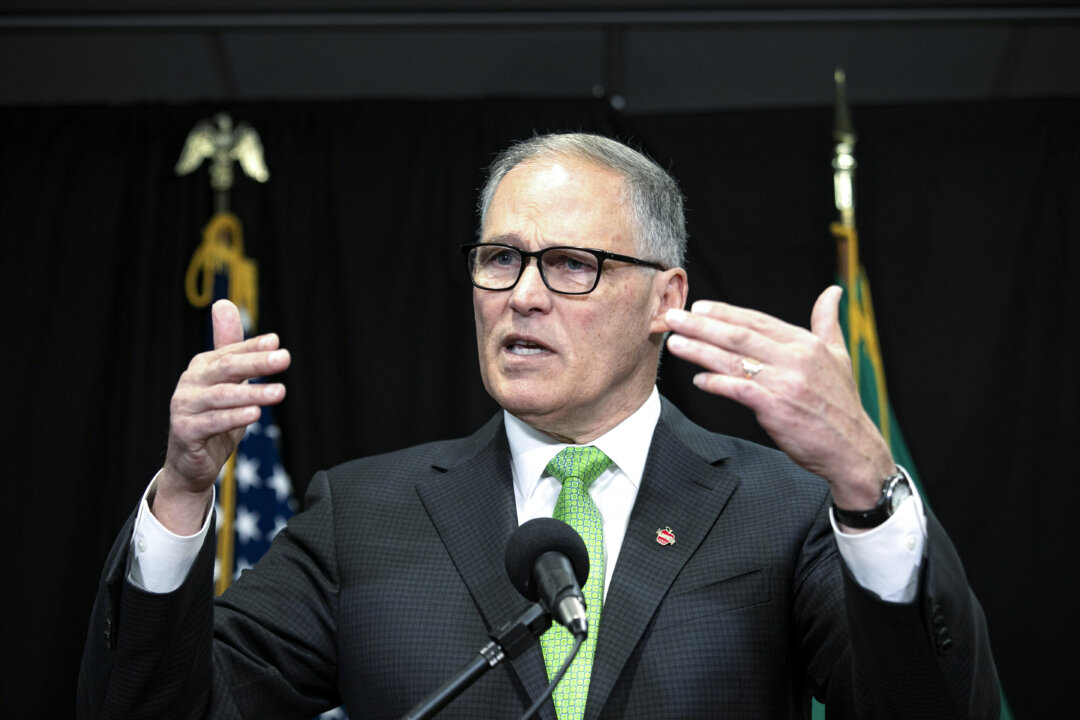Washington Gov. Jay Inslee has activated the National Guard to be on standby to assist law enforcement amid election-related violence concerns.
Washington Gov. Jay Inslee has activated members of the National Guard, placing them on standby to support local and state law enforcement in the event of an outbreak of election-related violence.
The “purely precautionary” deployment, as announced by Inslee on Nov. 1, follows warnings from the U.S. Department of Homeland Security that the 2024 election cycle could be a “key event for possible violence” and foreign influence targeting election infrastructure.
The deployment also comes amid concerns following a recent incident in Vancouver, Washington, where an incendiary device detonated in a ballot drop box, damaging or destroying hundreds of ballots. A similar incident occurred in Portland, Oregon, earlier this week.
“Based upon general and specific information and concerns regarding the potential for violence or other unlawful activity related to the 2024 general election, I want to ensure we are fully prepared to respond to any potential additional civil unrest,” Inslee said in a letter to Maj. Gen. Gent Welsh, the adjutant general for Washington state.
Welsh has been given the authority to determine how many National Guard service members would be activated, Inslee said, noting that the deployment will last four days, beginning on Nov. 4 and ending just after midnight on Nov. 7.
Inslee added that preparations for potential civil unrest will require coordination across various state agencies and departments, including activating extra resources and support roles within the Washington Emergency Management System. This suggests that the National Guard’s activation will be part of a more broadly coordinated response involving multiple state-level emergency resources to ensure public safety during the election period.
Besides the two acts of arson targeting ballot boxes in Portland and Washington, the Department of Justice announced at the beginning of October that an Afghan national had been arrested for plotting a terror attack on Election Day. As part of the plot, 27-year-old Nasir Ahmad Tawhedi allegedly took steps to sell off his family’s assets, move members of his family overseas, and acquire AK-47 rifles and ammunition.
“As charged, the Justice Department foiled the defendant’s plot to acquire semi-automatic weapons and commit a violent attack in the name of ISIS on U.S. soil on Election Day,” Attorney General Merrick Garland said in a statement. “We will continue to combat the ongoing threat that ISIS and its supporters pose to America’s national security, and we will identify, investigate, and prosecute the individuals who seek to terrorize the American people.”
Meanwhile, recent polling shows that the vast majority (76 percent) of Americans are at least somewhat worried about a possible outbreak of violence around the fast-approaching presidential election.
According to an Oct. 28 poll from the Associated Press-NORC Center for Public Affairs Research, 41 percent of registered voters were “extremely” or “very” concerned about post-election political violence, with another 35 percent saying they are “somewhat” concerned about an outbreak of unrest after Election Day. A separate AP/NORC poll, released on Oct. 31, indicates that voters are following the presidential campaign closely—and find it both anxiety-provoking and frustrating.
At the same time, the vast majority (92 percent) of local election officials have taken steps to increase security for poll workers, election infrastructure, and voters ahead of the 2024 election, according to a survey conducted earlier this year. The survey also showed that election-related safety concerns have reached or exceeded levels recorded in the prior election cycle.
To date, more than 73 million people have cast early votes either in person (39 million) or my mail (34 million), according to data released by the University of Florida Election Lab.

